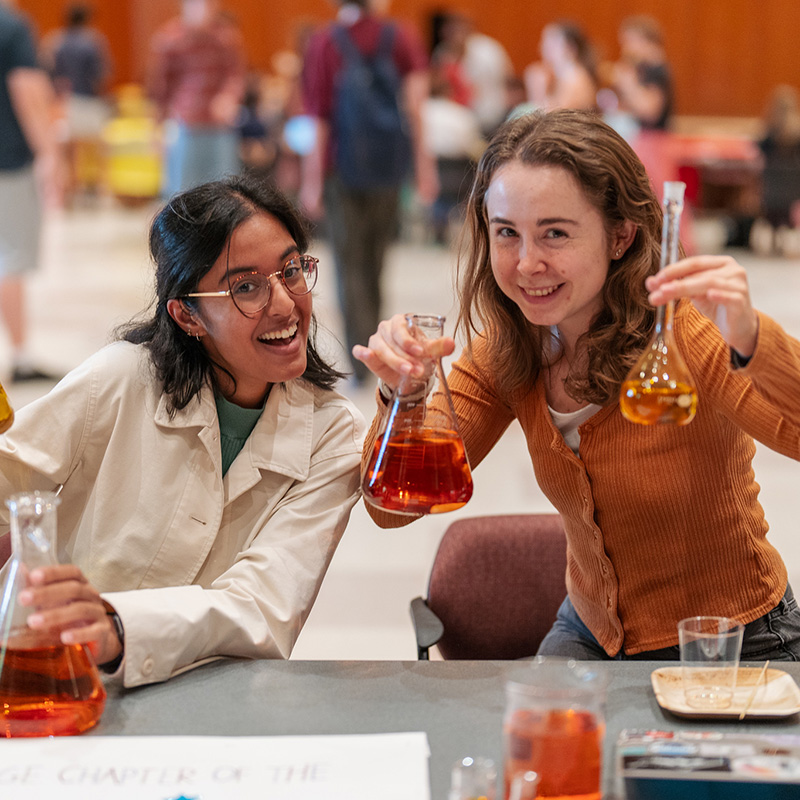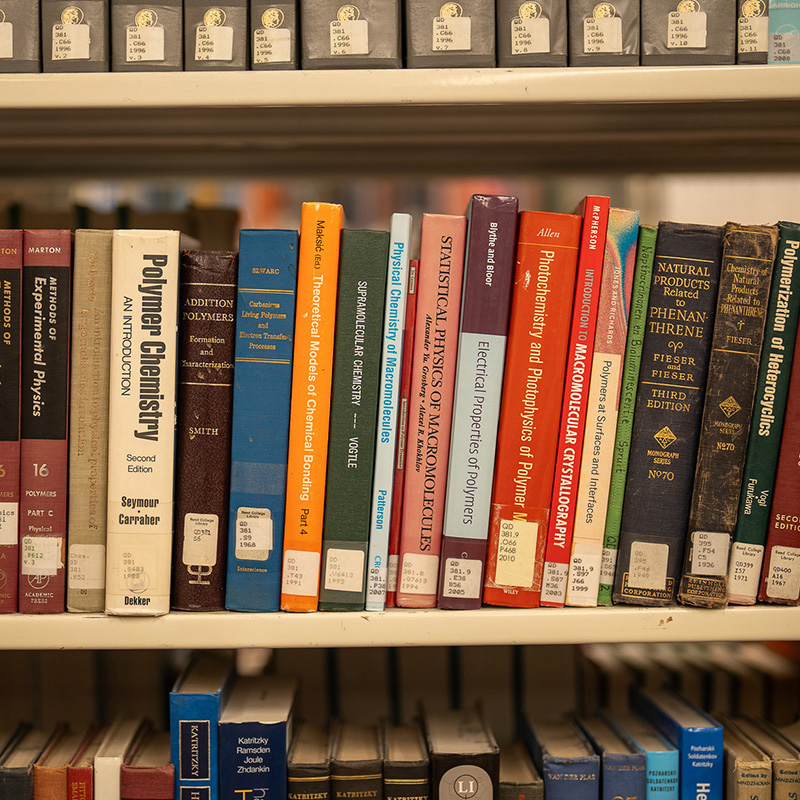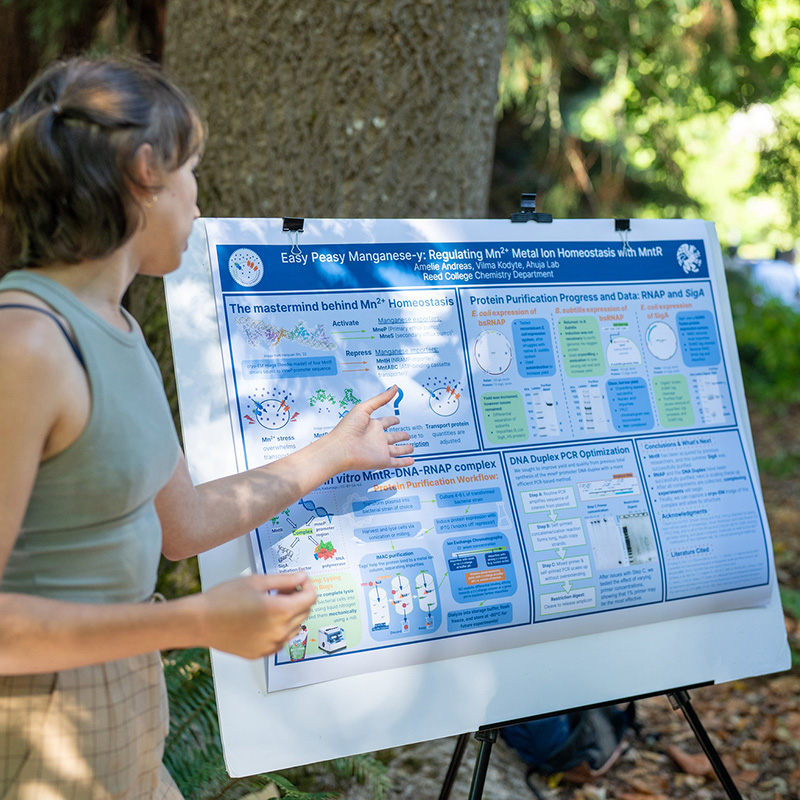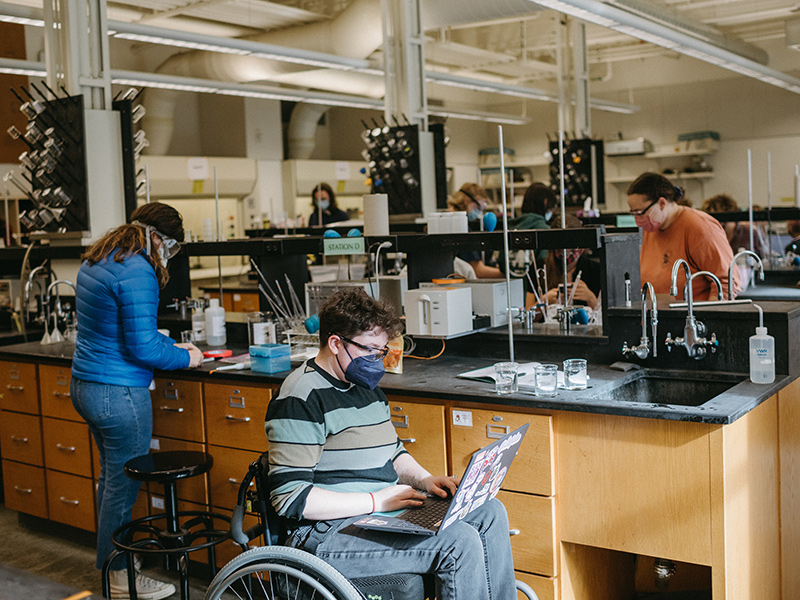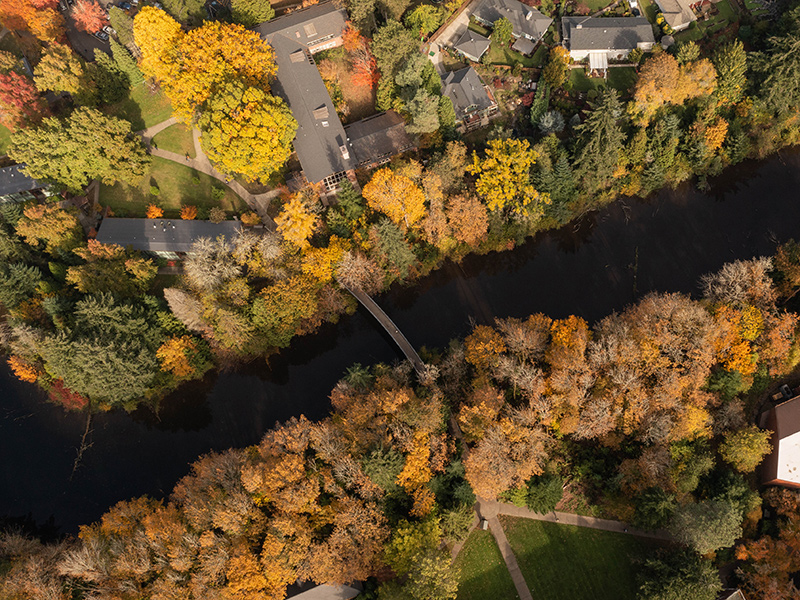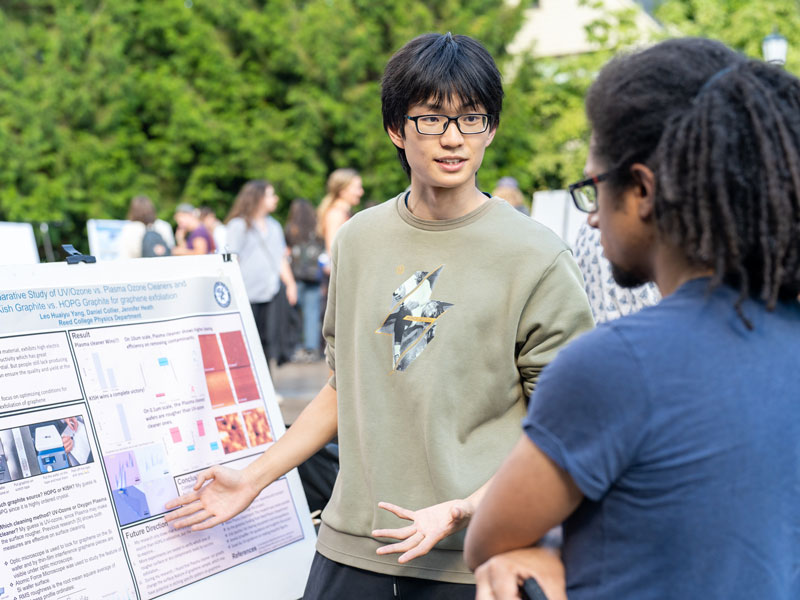Discover the properties of light and matter through examining the structure of the atom, spectroscopy, chemical bonds, and more. In this introductory course, learn from your professor in lectures, discuss current chemistry topics in conferences, and observe chemical phenomena in laboratories.
What You’ll Study in the Bachelor’s Degree in Chemistry
Explore the properties of atoms—the fundamental building blocks of our universe—as a chemistry major at Reed College. Our rigorous curriculum blends classroom learning and hands-on laboratory work so you can discover how these particles combine and interact to create the world around us. Prepare for advanced studies and a fulfilling career in chemistry-related fields through the chemistry department at Reed.
Roadmap to the BA in Chemistry at Reed
Develop analytical and research skills to understand chemical phenomena. Learn from our expert professors in classrooms and laboratories to gain firsthand experience in this growing field. Complete original research for your senior thesis.
Year One
Begin Your Chemistry Journey
Start by taking the introductory courses, Chemistry 101 and 102. Study fundamental concepts of atoms, light, and matter so you have the essential knowledge for further exploration in the field.
Take advantage of the chemistry department’s weekly seminars in which chemists from across the country come to share their work and insights. These fun events help broaden your understanding of current research and developments in the field.
Meanwhile, join fellow first-year students in Reed’s yearlong Humanities 110 class. This interdisciplinary course hones your critical thinking and writing skills, equipping you for success in your academic and professional endeavors.
Year Two
Building Strong Laboratory Skills
Deepen your understanding of chemistry with Organic Chemistry I & II, Inorganic Chemistry, and Analytical Chemistry and Instrumentation. Develop essential laboratory skills with these classes and accompanying labs.
Complement your chemistry studies with introductory physics courses. These calculus-based classes provide a solid foundation in concepts highly relevant to your chemistry studies.
Start planning your summer—consider becoming a research assistant in a faculty-led project or creating your own experiment. You can tap into Reed College fellowships and faculty grants to support your research opportunities.
Year Three
Gain Research Experience
Delve deeper into specialized areas of chemistry through advanced courses, such as Quantum Mechanics and Molecular Structure or Biochemical Methods. These lectures, conferences, and labs further solidify your understanding and prepare you for the junior qualifying examination. This exam assesses your readiness to undertake the senior thesis.
Reed College also provides opportunities to gain more research experience during your junior year. You can enroll in independent study courses, allowing you to conduct experiments under faculty supervision.
Year Four
Write and Present Your Senior Thesis
Having passed your junior qualifying examination, you are ready to embark on your senior thesis, a defining and rewarding experience at Reed College. In this unique educational project, undertake original scientific research with the guidance of a faculty adviser. Carry out your research, analyze your findings, write a scientific paper, and defend your work.
The senior thesis represents a significant accomplishment, demonstrating your growth as a chemist and your readiness to contribute to the field. It highlights your ability to conduct independent research and showcases your passion for scientific inquiry.
Why Study Chemistry at Reed College?
Knowledgable and Supportive Faculty
The faculty in Reed’s chemistry department are experts in the field, and many also have interdisciplinary approaches, leading to novel experiments and exciting findings from their labs. Grants from the National Science Foundation, the Camille & Henry Dreyfus Foundation, the American Chemical Society, and other organizations support their work.
Access to Scientific Instruments
Many chemistry courses include substantial laboratory work, allowing you to develop the experimental skills used by practicing chemists. Use a broad array of scientific instruments for your classes and research projects, including these:
- Gas chromatograph-mass spectrometer (GC-MS)
- Fourier transform IR spectrometers (FT-IR)
- Light sheet microscope
- Single crystal X-ray diffractometer
- Superconducting 400 MHz Fourier transform NMR spectrometer (FT-NMR)
- 250-kilowatt nuclear research reactor
Dual Degree Programs for Chemical Engineering
While Reed does not offer a chemical engineering program, our chemistry major is so rigorous that most graduate programs in chemical engineering will admit Reed students who graduate with a degree in chemistry.
You can also earn a degree in chemical engineering with our dual degree program in engineering. In this option, you can combine three years of study at Reed with two years of study at California Institute of Technology (Caltech), Columbia University, or Rensselaer Polytechnic Institute. If you satisfy these requirements, you can earn a bachelor’s degree at Reed and at your chosen institution.
Careers for Chemistry BA Graduates
Half of Reed students who graduate with a degree in chemistry go on to graduate school or technical graduate training. Here’s a sampling of positions held by current alumni:
- Assistant professor, Oregon Health & Science University
- Associate scientist, Impossible Foods
- Founder, Puppet by Perforce
- PhD Student, Columbia University
- PhD Student, Stanford University
- Postdoctoral researcher, Caltech
- Professor, University of Washington
- Professor, UC Santa Cruz
- Reactor electronics technician, Armed Forces Radiobiological Research Institute
Achievements of Chemistry Major Alumni
Our commitment to research propels our students and graduates to remarkable achievements, earning them recognition from esteemed organizations and peers in academia. Here are some awards and achievements:
- James Vesto ’21, National Science Foundation’s Graduate Research Fellowship
- Gabriela Bailey’20, National Science Foundation’s Graduate Research Fellowship
- Charis Roberts’19, National Science Foundation’s Graduate Research Fellowship
- Megan Duffy ’12, Fulbright U.S. Student Program
- Kevan M. Shokat’86, National Academy of Medicine, Howard Vollum Award
- Rebecca Braslau ’81, Thomas J. Watson Fellowship
- Rachel Klevit ’78, National Academy of Sciences
- Kenneth Koe ’45, Howard Vollum Award
Winner of the Lynwood W. Swanson Award
Kelly Chacón, Arthur F. Scott Associate Professor of Chemistry at Reed College, has won the Lynwood W. Swanson Promise for Scientific Research Award from the M.J. Murdock Charitable Trust. The award recognizes a junior faculty member who has demonstrated exceptional potential in establishing an exemplary, productive, and sustainable research program.
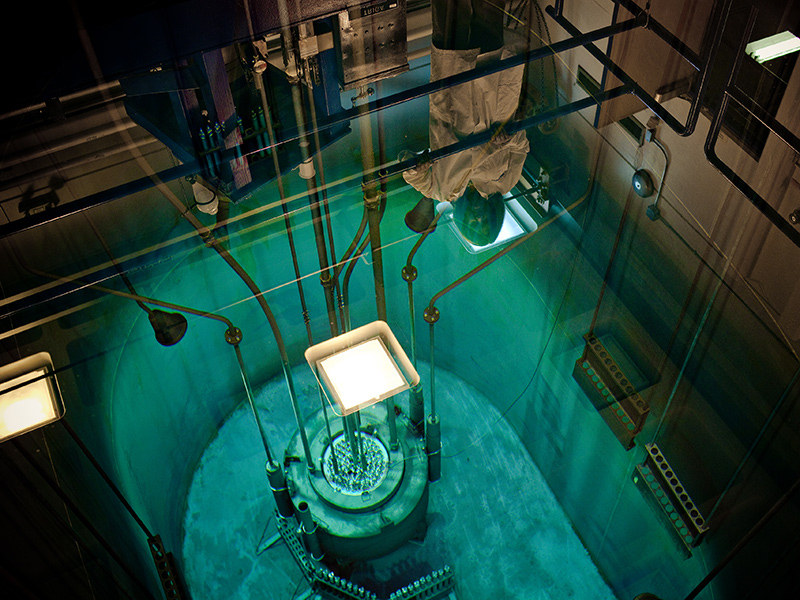
Conduct Research with a Nuclear Reactor
It’s true: Reed is home to the only research reactor at a liberal arts college, and it is operated primarily by students like you. Become a licensed operator, and use the Reed reactor to conduct experiments for projects for faculty, students, and other researchers.
